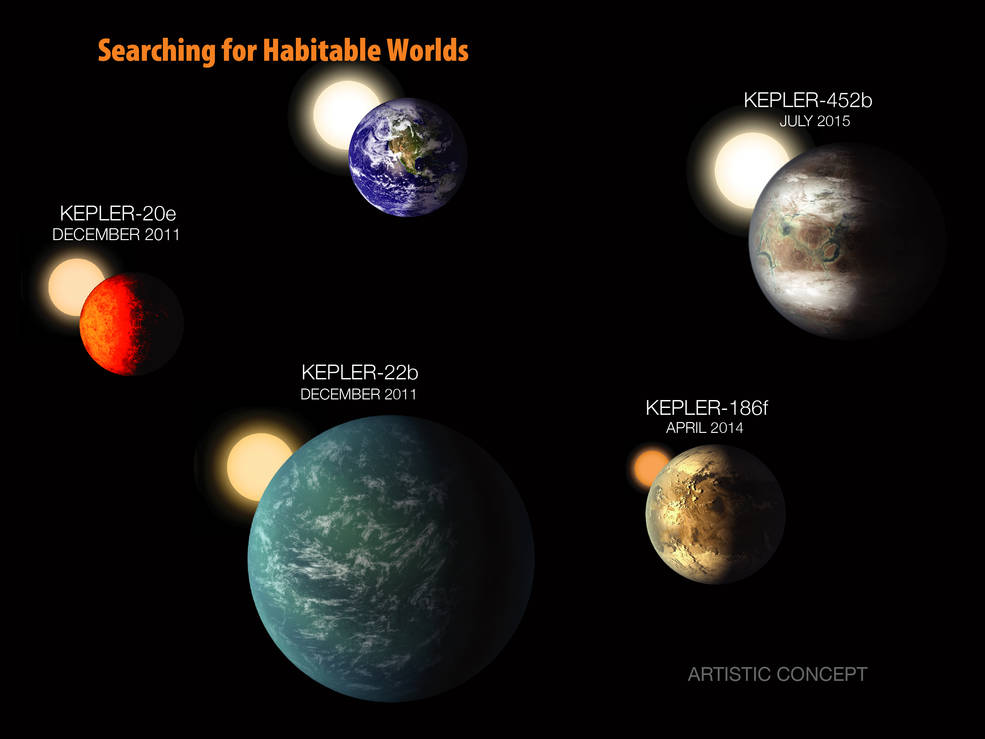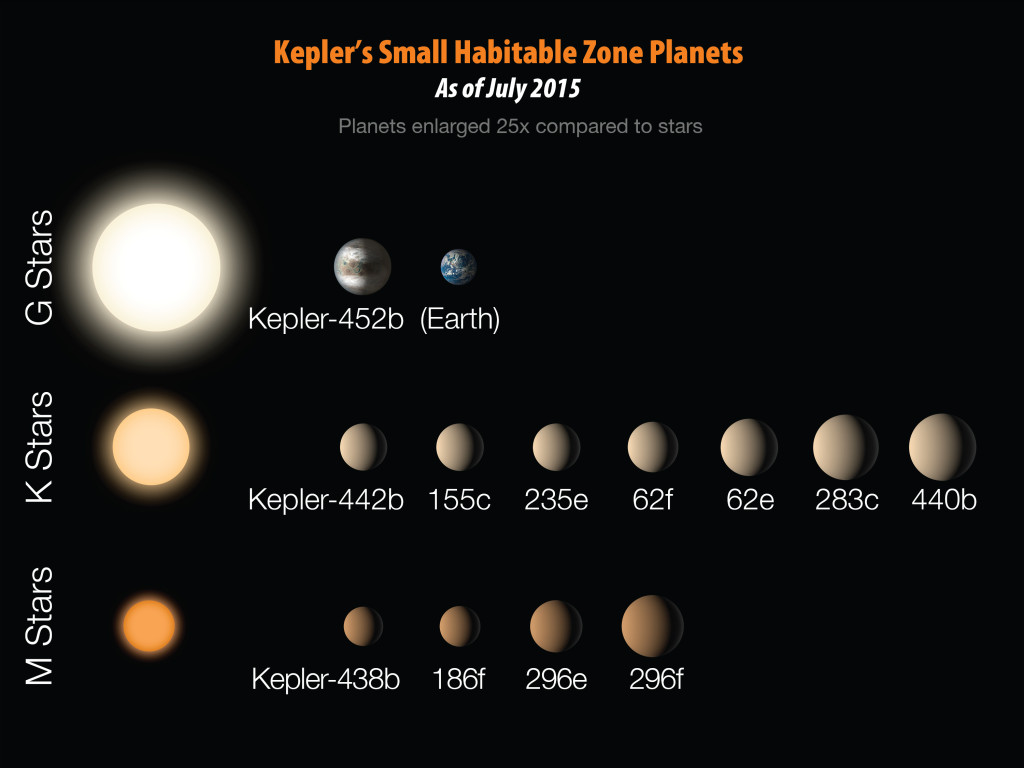This past week news buzzed with NASA’s announcement of the detection of another Earth-like planet—Kepler 452-b, not to be confused with the Kepler 186-f. Announcement of the Kepler 452-b discovery was made on July 23, 2015 and the planet is being called Earth 2.0.
NASA’s Kepler space telescope, launched March 7, 2009 with the mission to hunt for habitable planets, detected the new Earth-like planet.

Caption and Photo Credits: NASA Ames/W. Stenzel
According to NASA: Kepler measures the brightness of stars. The data will look like an EKG showing the heart beat. Whenever a planet passes in front of its parent star as viewed from the spacecraft, a tiny pulse or beat is produced. From the repeated beats we can detect and verify the existence of Earth-size planets and learn about the orbit and size of the planet.
The YouTube video below illustrates how the telescope’s data is interpreted.
(The scientific data from Kepler comes in a different way than most astronomy missions. The Kepler spacecraft will not produce pretty pictures or even colorful spectrograms, but rather light curves derived from brightness changes collected from transits. Caption and Video Credit: NASA Ames and Dana Berry)
(Kepler 452-b is the the most recent and first near-Earth-Size planet in the habitable zone of a star very similar to the sun. This is different from the Kepler 186-f which is the first Earth-size planet found in the habitable zone of a small, cool M dwarf. (M dwarf and near and similar to sun being the distinguishing differences.)
What We Know About Kepler 452-b
- It is in the Habitable Zone or Goldilocks Zone, which is a region around a star where temperatures are right for water—the necessity of life—to pool on the surface.
- It is 60% larger than Earth.
- It is in a class of planets labeled “super Earths.” (ProbeNote: Super-Earths have a mass higher than Earth’s and are considered exoplanets.) (ProbeNote: An exoplanet or extrasolar planet is a planet that orbits a star other than the sun.)
- Because of its size, there’s a good chance that the surface of Kepler 452-b is rocky.
- It orbits its star every 385 days.
- The Kepler 452-b’s star is about 1,400 light-years a way in the constellation Cygnus.
- It is a G2-type star like our sun, with nearly the same temperature and mass.
- This star is 6 billion years old, 1.5 billion years older than our sun.

Caption and Photo Credits: NASA/JPL-CalTech/R. Hurt
A Little Editorializing
According to NASA: As stars age, they grow in size and give out more energy, warming up their planets over time.
WAIT! What The FRAK!?
That was my reaction when I read the sentence.
So questions:
- Is this like global warming and are we destined to eventually burn up no matter what we do to save our environment?
- Is that why NASA is in sending out missions to locate Earth-like planets?
- Is that why Stephen Hawking says “our future lies in space”?
- What does NASA know that they’re not telling?
- If life on other planets is found, what does that do religious beliefs here on Earth?
- If we could get there, could mankind adapt and survive on a planet like Kepler 452-b?
ProbeFiling: Looking For Answers
I pondered such questions as my family busied themselves living out their Sunday morning chillax time. In my research, I found two interesting blogs addressing the last two questions.
Mike Wall, Space.com senior writer, posted an article July 24, 2015 titled: Kepler 452-b: What It Would Be Like to Live on Earth’s Cousin. According to Wall, new settlers to Kepler 452-b would feel twice as heavy due to the predicated stronger surface gravity. Though a challenge, Wall cites former astronaut John Grunsfeld, current associate administrator of NASA’s Science Mission Directorate, as saying it would be possible for Earthlings to adapt.
Grunsfeld referenced heavy gear carried by firefighters and backpackers as examples of the effect of increased surface gravity. He seemed to think we’d get stronger. “Like a workout everyday,” he said.
“I suspect that, over time, we would adapt to the conditions, and perhaps become stockier over a long period of many generations,” said Jon Jenkins, of NASA’s Ames Research Center in Moffett Field, California.
Colonists to the new world would find the sunshine similar to Earth’s, but since Kepler 452-b’s star is older at this point in it’s evolution the planet receives 10% more energy from its parent star than Earth currently does from our sun.
A few models indicate that if Kepler 452-b’s surface is rocky it could become subject to a runaway greenhouse effect (or as I like to say: hotter than Texas) until the oceans boil away as some researchers suggest happened on Venus. But that won’t happen on Kepler 452-b for another 500 million years, Jenkins says, if estimates of the planet’s size and the star’s age are accurate.
“But, you know, we don’t know exactly,” Jenkins said.
No Jenk, we don’t know.
And What of Religion?
Jeff Schweltzer, scientist and former White House Senior Policy Analyst with aPh.D. in marine biology/neurophysiology, speculates on the direction of religion should life on other planets be confirmed. In his July 23, 2015 article in the Huffington Post titled: Earth 2.0: Bad News for God. Schweltzer suggests that religions would adapt and accommodate a new reality of alien life. “I predict with great confidence that all will come out and say such a discovery is completely consistent with religious teachings,” he says.
An interesting summary of how various religions might handle the explanation of life on other planets was offered at The Boston Globe on October 26, 2014 written by Chris Walker, a London writer and editor. It was enlightening for me to note that of the ten religions mentioned, half could already incorporate extraterrestrials into their beliefs.
The summary is based on information gathered from the book, Religions and Extraterrestrial Life: How Will We Deal With It?, by author David Weintraub. According to the summary:
- Any sentient being anywhere in the universe could practice Hinduism.
- Buddhism works everywhere in the universe.
Well, apparently not everywhere in the universe, unless we exclude Earth. (Lovely thought though.)
So my speculation is that God would say: “good on ya, Mate”, to those religions that were visionary enough to see the future and incorporated the possibility of life elsewhere in the universe into their doctrines.
Another Big Question or WTFrak
If Kepler 452-b is plummeting into a runaway greenhouse effect, as some models suggest, then is our greenhouse effect happening here on Earth caused by human negligence and greed as we’ve been blamed, or is it just part of the evolutionary process the universe stimulates in order to force creatures into becoming star gypsies?
I did a quick poll last night with my google+ sci-fi community and asked the above question. Of the 241 science fiction fans who voted:
29% believe it’s all our fault
22% think it’s part of a natural process
49% think it’s some of both
According to Wikipedia: Most scientists believe that a runaway greenhouse effect is actually inevitable in the long term as the Sun gradually gets bigger and hotter as it ages (like Kepler 452-b’s star). As the Sun becomes 10% brighter in about one billion years’ time, the surface temperature of Earth will reach 47 °C (117 °F), causing the temperature of Earth to rise rapidly until it becomes a greenhouse planet similar to Venus today.
Did extraterrestrials cause the greenhouse effect on Venus? Or was it just part of the process?
I loved to know what you think.
The Probe’s Mission Statement

The Probe is a blog devoted to the exploration of the unexplainable, to finding the truth in occurrences that resemble science fiction, and to researching and reporting on topics that could be flung upon the wall of weird. New posts are featured every week.
(Mostly on Mondays, but sometimes I release early, like on Sundays, if I have a writing deadline, or if I’m going camping, or if I have something exciting I just can’t wait to tell you. And sometimes I’m late if I’ve gone camping or have family visiting or an alien has taken up residence on my face—like last week.)
Sign up to get my weekly, slightly irregular blog posts delivered directly to your email. No spam. Promise.
blog post #116

- Coghlan’s Traveling Coffin Urban Legend - April 4, 2024
- Richmond Vampire Urban Legend - March 7, 2024
- Lick Lick Urban Legend - February 8, 2024

9 replies on “If Life is Found on Kepler 452-b, What Will God Say?”
This is very interesting! I love contemplating out of the box. As for religion, I firmly believe you will have mixed feelings. Some people will probably approach them like they are heathens, or that they have no souls. I think in this time that we can count on people adapting pretty well if that happened, though. It seems like only some extremists wouldn’t be able to incorporate other species into their religion.
As far as the greenhouse effect. . .WOW. I didn’t know that! It’s very interesting to contemplate. Greenhouse gases, if I’m not mistaken, aren’t just from humans. They also happen because of the sun getting in and not being able to get out as easily (thanks to pollution). From what I understand the warming of the Earth isn’t all humanities fault. The Earth heats from so many different things, including decomposition. At any rate, the discovery of greenhouse gases is awesome because it could point to life activities, or at least some kind of atmosphere!
Yes, I definitely believe thinking outside the box is the place to think. When I’m in the box it’s hard to breathe let alone think.
I never thought about the greenhouse effect happening on other planets.I mean every time I pick up my dog’s poop with a little plastic baggy, I feel guilty. I tell myself just leave it, it’s fertilizer. Then some kid steps in it. Then there’s that to deal with. And driving my jeep, the whole time I’m thinking: Greenhouse gases, GREENhouse gases, GREENHOUSE GASES! Well, not the entire time. So I breathed a little easier reading greenhouse gases are a naturally occurring process as our planet ages. Took a few of the guilty feelings away. I realize we are partially responsible for speeding up the process—MAYBE.But the quicker we realize our Earth won’t always be around, the quicker we all become space gypsies. Don’t you think?
Thanks for stopping by and for the great comment, Travis. Travis has great/crazy posts on his blog that will make you laugh. Especially clever, is his series on the CARE OF MAGICAL CREATURES. http://travissimmons.net/blog/
Ooooo, I’d love to be a space gypsy! I think it would be so awesome. I’m so happy to be alive in this time when I get to (maybe) live to see the discovery of the FIRST alien, but I’m also a little sad that I won’t be alive to travel in space 🙁
Maybe that’s why I love your Creep Mesquite series so much! I get to experience that lol.
Ah yes, space gypsies indeed. What a life. Thank you for the kind words. So glad you are enjoying the series.
I’m actually done with it so far. Waiting (im)patiently for the next installment! Loved Better Dig 2. But Jaime and I were talking. . .what are they digging two of? You can email me the response so there’s no spoilers here hahaha.
So glad you liked it. You just made my day. Thank you.
I’ll give you a hint so no spoilers.
Hint= Song by The Band Perry.
I have finally found some time to read and today I read this post.
In answer to your question “What will God say?” I think He might say, “I am not surprised, I suspected it all the time”.
What I really liked about this post is that it alludes to the same ideas that I posted about in my blog “Spaceship theology”.
Well as a Christian that loved science and planets what so ever I can give you a passage from Revelations you don’t have to believe me or you might consider but it is fun to find cool things about science. God did mentions a new earth that he is creating and a new heaven and all things will be new. He already created it long before the earth was created just in case something terrible or shuch things. It is written that incase of an the day of reckoning comes he already planned it. God won’t let his followers or his Angels nor his high ranking arch angels about his plans only himself. So basically he made K452b in case some bad mess happens god made the stars and everything that what christian scientists claims.
Hi Ronnie,
Thank you for your insightful comment. I loved your citation from Revelations and I believe you really are onto something here.I’m definitely a believer, but not in the Sunday-go-to-church kind of way. I find many churches seek to close an individual’s mind rather than open it up to all the possibilities the Creator has put before us. Glad to know your mind is open. Thanks for stopping by. —Clara